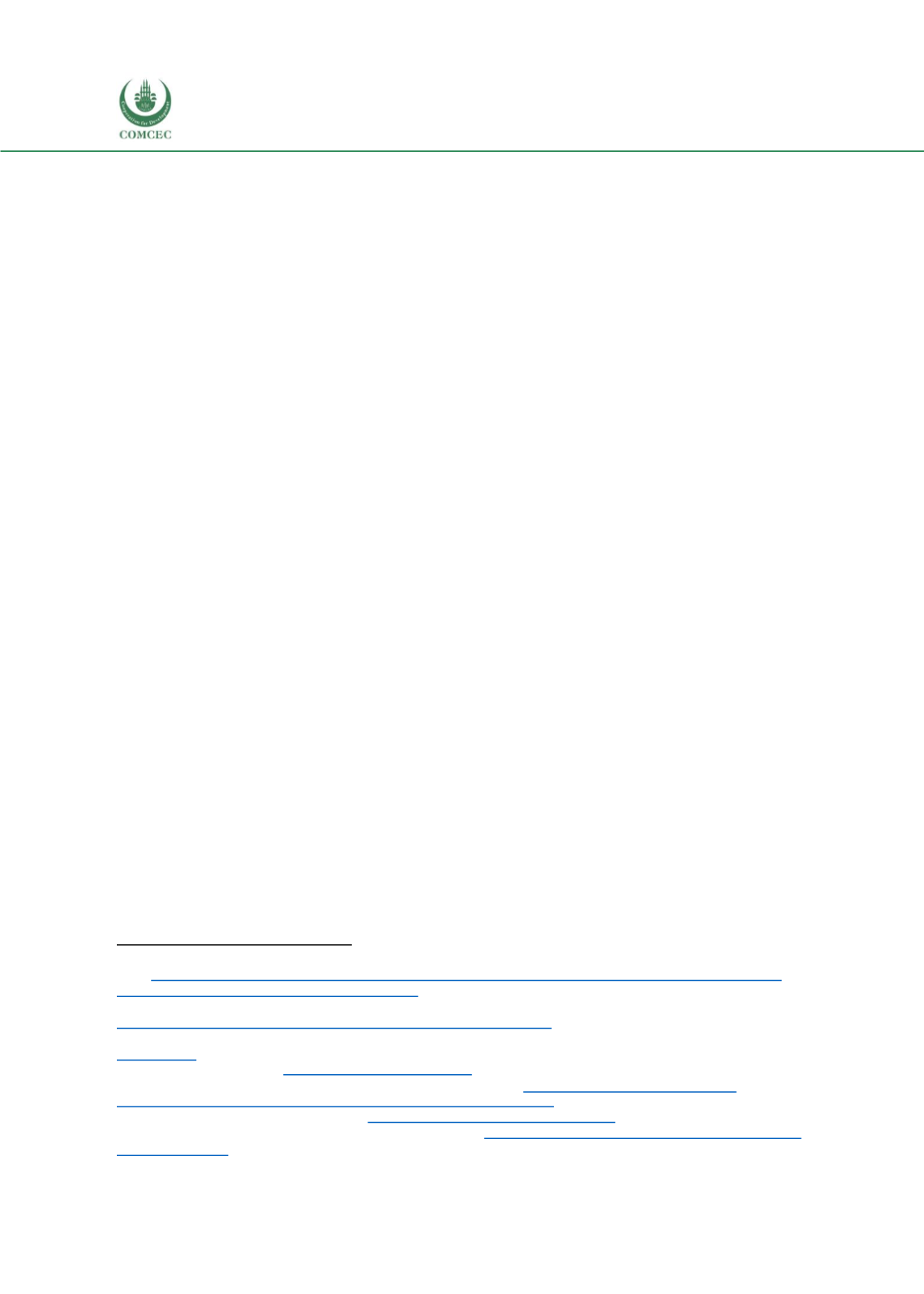

Increasing the Resilience of the Food Systems
In Islamic States in Face of Future Food Crises
138
A third opportunity to strengthen food systems across the OIC lies in capitalizing on a broader
developing investment ecosystem, which spans cross-OIC institutional investments, sovereign
wealth funds, and private investments. The Islamic Development Bank is an important
stakeholder and financier that supports the strengthening of the cross-OIC food systemwith $16
billion in operating assets. The banks relocation outside of Saudi Arabia will help it improve
interactions with members across the OIC,
544
with a push from the UNFAO to train the bank’s
management to identify and invest in opportunities that enhance food security.
545
Sovereign wealth funds also play an important role within and without member countries and
allow them to pursue transformational investments. Qatar Investment Authorities invested $1
billion in Hassad Food—an investment arm specializing in agriculture and livestock
development, with their open investments in agribusiness andmeat processing across Australia,
Oman, and Turkey of over $600 million.
546
Another example is The Dubai Investment
Corporation’s investment in Emirates Rawabi, the largest dairy and poultry producer in the UAE,
with 1,700 employees and 460 hectares of farmland.
547
A fourth opportunity lies in galvanizing the Zakat industry to ensure that social safety nets are
made available, particularly to themost vulnerable OIC countries. The amount of Zakat collected
is estimated to be $78 billion globally in 2018 and could play a substantial role in providing
emergency funds to those facing malnutrition, especially refugees, who are deemed a high
priority for Zakat Funds.
548
OIC Threats
The OIC’s performance on environmental factors has been poor, exacerbating the risk of
environmental disaster. A SESRIS study in 2017 found that OIC countries perform the worst
among all country groups, with a score of 59.4 compared to 65.4 for non-OIC developing
countries and 85.4 for developed countries.
549
Water shortages represent a substantial risk in the OIC and are a major threat to food security.
The Middle East and North Africa are effectively drought zones, with very low rainfall. At the
country level, though Indonesia and Bangladesh have the highest total amount of renewable
resources—over 1,000km3/year—Kuwait and theMaldives have the lowest, with 0.02 and 0.03
km3/year, respectively.
550
544
Torchia, Andrew. “Islamic Development Bank tomove staff outside Saudi, lead projects in strategy shift.” Reuters. Jun 05,
201
8. https://www.reuters.com/article/us-islamic-develop-reform/islamic-development-bank-to-move-staff-outside- saudi-lead-projects-in-strategy-shift-idUSKCN1J20ED545
“FAO trains Islamic Development Bank project managers on climate-smart agriculture.” FAO. Mar 18, 2019.
http://www.fao.org/climate-smart-agriculture/news/detail/en/c/1185889/546
Guerrero, Tomas. "MuslimWealth FundsStalk Halal Food Acquisitions."
Financial Times.
May 04, 2016.
https://www .ft.com/content/cd8a7f42-e4cd-3da8-a998-5cdc3cae0f0c.547
Emirates Rawabi websit
e. https://www.emiratesrawabi.ae/548
“UNHCR Zakat Program: 2019 Launch Report.” DinarStandard. 201
9. https://www.dinarstandard.com/wp- content/uploads/2019/05/UNHCR-Annual-Zakat-Report-2019-FINAL-EN.pdf549
“OIC Environment Report 2017.” SESRI
C. http://www.sesric.org/files/article/586.pdf550
“Overview ofWater Related Issues in OIC Member Countries
.” http://www.sesric.org/files/oic-water-vision/overview- of-water-issues.pdf















